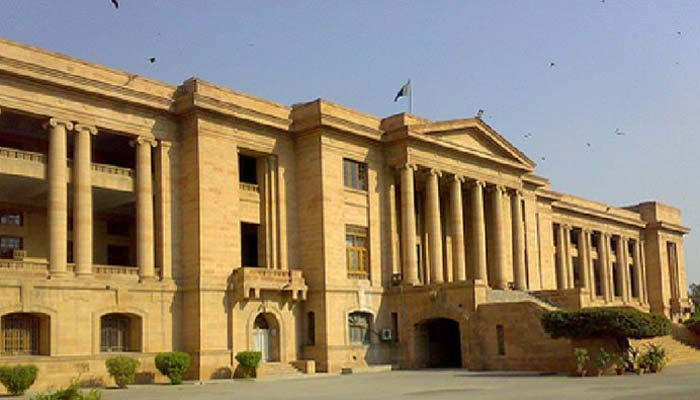SHC suspends Sindh decision to reduce MDCAT pass marks
KARACHI: The Sindh High Court (SHC) Friday set aside the Sindh cabinet decision and notification with regard to lowering pass marks for medical and dental colleges admission test (MDCAT-2021) from 65 per cent to 50pc for the province and declared that the impugned decision and notifications were issued without any lawful authority.
The decision came on a petition, filed by the Pakistan Medical Commission (PMC) against the Sindh cabinet decision for lowering the passing marks from 65pc to 50pc for Sindh medical colleges.
PMC Counsel Zeeshan Abdullah submitted that the Sindh government had no legal right to allow students, who had failed the MDCAT examination, to be eligible for admission to medical and dental colleges in Sindh. He submitted that fixing the passing marks for the MDCAT examination was the exclusive domain of the PMC under Section 18 of the PMC Act and requirement of MDCAT being mandatory and within legal mandate and domain of the commission was now well established on account of a number of judgments by the superior courts.
He submitted that the Sindh government had no right to allow Jinnah Sindh Medical University and Shaheed Mohtarma Benazir Bhutto Medical University Larkana to initiate admission process in private sector medical and dental colleges of Sindh. The counsel submitted that the Sindh government was promoting a culture where private colleges were able to give admissions in return for donation and bribes, thereby depriving students who have a higher merit but on account of their modest background could not afford to pay such huge sum of money.
Advocate General Sindh questioned maintainability of the petition, submitting that the issue raised in the petition could not be entertained on writ jurisdiction as matter pertained to a province and the federal government which should be taken up before Supreme Court under Article 184(1).
The Attorney General for Pakistan submitted that the PMC was not a federal government but a statutory body which could agitate the matter in the high court if interference was made in its domain.
The health secretary submitted in his comments that the Sindh government, pursuant to its policy, had decided for the admission session 2020-21 in respect of private medical and dental universities and colleges to reserve 95pc seats for candidates of Sindh domicile while 5pc for other provinces on reciprocal basis.
He submitted that if trend of admissions to other province continues then after few years, the Sindh province would face server shortage of doctors as every year dropout ratio would stand 1,800 and in coming five years, the cumulative figure would stand around 10,000 lesser doctors and dental surgeons in Sindh.
He submitted that province of Sindh had its own dynamics and distribution of medical and dental seats in districts are allocated on the basis of population. He said that once public sector seats are filled on merit and self-finance, private sectors seats start to get filled. He submitted that since the PMC is formed, its irrational policy has created a lot of issues which need to be addressed. He said that instant controversy pertains to the subject education which falls in the provincial domain therefore the PMC cannot claim any regulatory mandate.
The SHC full bench, headed by Justice Mohammad Iqbal Kalhoro, after hearing the arguments of the counsel, for reason to be recorded later on, allowed the petition and declared that impugned decision and notifications were void ab-initio, having been issued without any lawful authority.
-
 China Cuts Anti-dumping Duties On Canadian Oil Imports After Final Trade Decision
China Cuts Anti-dumping Duties On Canadian Oil Imports After Final Trade Decision -
 Prince Harry, Meghan Markle Make Major Change To Strategy To Please Royal Family
Prince Harry, Meghan Markle Make Major Change To Strategy To Please Royal Family -
 Chester Bennington’s Mental Health Story And Lasting Legacy
Chester Bennington’s Mental Health Story And Lasting Legacy -
 John Cusack Gears Up To Give Fans Exciting Surprise On Late-night Television
John Cusack Gears Up To Give Fans Exciting Surprise On Late-night Television -
 Yerin Ha Opens Up About Shocking Diagnosis Post ‘Bridgerton’ Season 4
Yerin Ha Opens Up About Shocking Diagnosis Post ‘Bridgerton’ Season 4 -
 Meghan Markle, Harry Leave King Charles, Prince William Furious With Latest Move
Meghan Markle, Harry Leave King Charles, Prince William Furious With Latest Move -
 NASA Announces New Artemis Moon Mission Aimed At Expanding Astronauts’ Exploration Efforts
NASA Announces New Artemis Moon Mission Aimed At Expanding Astronauts’ Exploration Efforts -
 Everything To Know About Justin Bieber's Facial Paralysis
Everything To Know About Justin Bieber's Facial Paralysis -
 Morgan Stanley Predicts AI To Replace Tasks Not Workers
Morgan Stanley Predicts AI To Replace Tasks Not Workers -
 Anthropic Dario Amodei Calls White House Response ‘retaliatory’ In AI Safety Dispute
Anthropic Dario Amodei Calls White House Response ‘retaliatory’ In AI Safety Dispute -
 Tia Mowry Breaks Silence On Angelina Jolie Asking 'unbelievably' Personal Question: 'Wilder'
Tia Mowry Breaks Silence On Angelina Jolie Asking 'unbelievably' Personal Question: 'Wilder' -
 Savannah Guthrie Speculations 'sadly' Coming True About Mother Nancy
Savannah Guthrie Speculations 'sadly' Coming True About Mother Nancy -
 Trump Administration Warns Of Slow Payouts For Tariff Refunds Amid Intensifying Trade Disputes
Trump Administration Warns Of Slow Payouts For Tariff Refunds Amid Intensifying Trade Disputes -
 Princess Beatrice 'far From Comfortable' After Father Andrew's Arrest
Princess Beatrice 'far From Comfortable' After Father Andrew's Arrest -
 Sarah Ferguson’s Dual Cancer Journey
Sarah Ferguson’s Dual Cancer Journey -
 GTA 6 Security: Rockstar Blocks Leaks Ahead Of Launch
GTA 6 Security: Rockstar Blocks Leaks Ahead Of Launch




